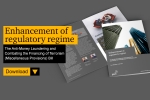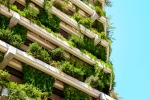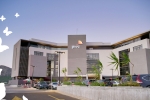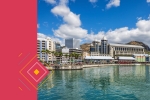A sustainability prelude from PwC

The Current Context
As we near the next Budget Speech by the Hon. Minister of Finance, Economic Planning and Development, our community of solvers at PwC are heedful. At a time when the world is being re-invented and where governments, businesses and communities are accelerating the movement to live, work and give back differently, we think that the Mauritius National Budget has the potential to reshape our nation for the next generation.
Last year, the Minister started his Budget presentation with a quote from Joseph E. Stiglitz, “the only true and sustainable prosperity is shared prosperity”. Meanwhile, the impact of the carbon footprint of major global emitters is being felt in our part of the world, is evidenced by rising sea levels and more irregular weather conditions being registered in Mauritius year after year. These changes have socioeconomic consequences affecting livelihoods and the quality of our lives.
As per the World Bank, the global economy cannot afford the collapse of ecosystem services. Such a collapse would cost 2.3 percent of global GDP ($2.7 trillion) annually by 2030 and some of the poorer countries would be hit hardest.
Blue and green biodiversity and ecosystem services are nevertheless being lost at an unprecedented rate and scale in human history, with potentially far-reaching implications for economies and livelihoods. Mauritius has one of the most threatened island flora in the world (“UN Environment Programme, Mauritius country profile”). The country spans only 2,040 square kilometres but has game changing opportunities for ecosystem policy development with its exclusive economic zone covering 2,300,000 square kilometres. The marine and coastal environment already provides large economic benefits to our Mauritian society through activities linked to tourism, fisheries and other marine ecosystem driven opportunities.
Hence, our prelude to the Mauritius National Budget tries to provide a new lens in an attempt to share the importance of nature in building a sustainable Mauritian economy. As per the World Bank Research, in many countries, GDP is increasing at the expense of total wealth and future prosperity. Evidently, a country’s GDP and wealth is directly dependent on its natural capital.
If not properly informed, citizens might mistakenly expect their improving prosperity to continue indefinitely. If rising GDP today comes at the expense of declining wealth per capita, then prosperity will be unsustainable. Economic growth will erode its own base. Hence, we must move beyond GDP, and build our country's balance sheet which accounts for our natural assets.
An example of a sustainable economic approach that recognises the importance of nature is the concept of the blue economy. The blue economy emphasises the sustainable use of ocean resources while preserving marine ecosystems and biodiversity. For coastal nations like Mauritius, the blue economy offers opportunities for economic growth through sectors such as sustainable fisheries, marine tourism, renewable energy from offshore wind and wave power, and the development of marine biotechnology.
Where we stand on our Sustainability Journey
SGDs, NDCs & Last Year’s Budget in Perspective
As per the the latest available data from “The Sustainable Development Report (2022)”, out of the 17 SGDs, Mauritius is stagnating or increasing at less than 50% of the required rate on six SDGs, including Affordable and Clean Energy, Climate Action, Zero Hunger, Decent Work and Economic Growth, Life Under Water and Life on Land. While we are making good progress on the other SDGs, there is still a lot to be done.

In last year’s Budget, the Green Transformation and Energy Transition initiatives were driven with Mauritius' Nationally Determined Contribution (NDCs) in view. Targets have been set in line with the Paris Agreement for mitigating the greenhouse gas (GHG) emissions that cause climate change. Key highlights of the NDC submission for Mauritius include:
- reducing 40% of our GHG emissions by 2030 compared to business-as-usual;
- achieving 60% of our energy production from renewable sources by 2030;
- phasing out the use of coal and increasing energy efficiency by 10% based on a 2019 baseline.
The policies suggest that the kernel of the Government’s green agenda centres around climate mitigation efforts. However, as is the case for most African countries, Mauritius is a relatively insignificant carbon emitter. Our economy can therefore be made more resilient by allocating additional Budget towards climate change adaptation rather than towards mitigation measures.

Our Expectation from the 2023/2024 Budget
While climate concerns and GHG emissions have obtained the lion’s share of the environment-related financing in last year’s budget, we believe that more resources should be alloted to protect our nature, biodiversity and the oceans. Bearing in mind that 89% of the Mauritian flora is considered threatened, as per the Convention on Biological Diversity, we expect that future policies should ensure the protection of marine life as well as plant and animal species on the Island.
Going further, as a nation dependent on its natural resources, we see a need to start thinking beyond GDP and start measuring “fully” the true wealth of our country and society. A need to set forth an agenda to integrate our natural capital into our country’s official economic output.
The recently adopted Kunming-Montreal Global Biodiversity Framework (GBF) paves the way to close the US$700+ billion annual investment ‘gap’ for nature. However, achieving the framework’s target of mobilising US$200 billion per year of finance for nature will require innovative mechanisms and external market forces with both public and private sector engagement. To date, public finance has shouldered the lion’s share of the responsibility for natural capital investment. However, public finance alone will fall far short of the required levels of investment needed to achieve a nature-positive future.
Recent research by PwC’s Centre for Nature Positive Business (Pdf 14.3mb), based on an analysis of some 80 nature finance vehicles and interviews with 40 stakeholders, produced several recommendations for how to expand the volume of private capital going into projects that protect and restore nature. And those recommendations are significant: new project structures, public–private financing mechanisms, better communication between project developers and investors, and higher-quality data could all create opportunities to build value by protecting the world’s precious natural assets.
Nature-smart policies can reduce the risk of ecosystem collapse and are “win-win” policies in terms of biodiversity and economic outcomes. Mauritius is very well positioned to benefit from these policies. Sectors that together contribute to more than 50% of the current GDP of the Mauritian economy could potentially increase their metabolic rate by adopting nature-centric strategies. And, the Covid-19 pandemic has shown us that the Mauritian economy needs to build resilience by further deepening their presence in these important sectors or by diversifying into new ones.
| Sectors | Current GDP Share % | Nature driven policies or strategies to drive sustainable growth |
|---|---|---|
| Financial Services | 13.3% | - Position Mauritius as a Sustainable Finance Hub for Africa. A total of USD 600bn (approx) is required per annum for sustainable projects in the continent and is an opportunity that our country should not miss to become a pathway for that finance gap. - Encourage financial institutions to develop green finance products and services, such as green bonds, green loans, and other sustainability-linked financial instruments. Globally, sustainable capital is cheaper by almost 75 bps and the same needs to be made available for capital allocation in the region. - Define a Regulatory Framework to govern the growth of sustainable finance and taxonomies to clearly articulate what is ‘green’ and ‘sustainable’ along with disclosure norms. - Provide differentiated incentives to Private Equity and Venture Capital players to invest in FinTechs and Green institution initiatives such as setting up of Open banks, Green banks. - Standardised reporting for all financial institutions and corporates making use of sustainable finance instruments via the Hub. |
| Manufacturing | 13.3% | - Implement sustainable manufacturing practices to reduce the environmental footprint of industries and minimise resource depletion. - Adopt the OECD Checklist for Action for circular economy, based on 12 key governance dimensions which provides guidance to governments to promote, facilitate and enable the circular economy. - Introduce incentives for investment in green technologies leading to higher utilisation of raw materials and reduction in waste discharged in the manufacturing process. - Invest in high end incubator infrastructure to position Mauritius as a Sustainable R and D Hub. |
| Tourism (Direct and Indirect) | 24% | The number of tourist arrivals in Mauritius has remained quite static with an average of 1.2m visitors per annum. Product diversification with more ecotourism attributes could help to boost arrivals. Recommended policy decision would include: - Promote ecotourism by facilitating global and regional strategic alliances among governments,tourist organisations and the industry. - Improve ecotourism products. The Government can give greater emphasis to ecotourism through the preservation of natural attractions such as wildlife sanctuaries, national parks, highlands and islands. - Strengthen and develop capacity of the local communities and government institutions through training in cultural heritage interpretation, hospitality, communication skills etc. |
| Agriculture, forestry and fishing | 4% | Agriculture - Policies to increase food security in Mauritius including, supporting primary production and ensuring that food security programmes are adequately monitored and evaluated in a participatory manner. Blue Economy - The African Union calls the Blue Economy the "New Frontier of African Renaissance". The Mauritian Government aims at increasing the share of GDP of the blue economy to 20% in the medium term. This ambition cannot be met without the right policy decisions. A strategic and integrative framework necessitates a new way of thinking about new sources of development opportunities. This requires transformative policy thinking and creative and workable policy instruments. These may include: - Collaboration with other countries to exchange successful strategies, information, knowledge and best practices. - facilitating the deployment of new technologies and innovations to create and drive environmentally-compatible industries. - Developing the economic empowerment and resilience of communities living around oceans, seas, lakes and rivers. - Building economic instruments to leverage environmental protection, such as blue carbon, blue bonds and coastal resilience insurance.
|
In addition, a national level Sustainability Policy backed by an integrated sustainability framework is required to drive a coordinated and data-centric approach to achieving sustainability in Mauritius. We believe that Mauritius could also adopt a standardised national framework to measure the changes in the stock and condition of its natural capital (ecosystems) at a variety of scales, and to integrate the flow and value of ecosystem services into accounting and reporting systems in a standard way.
We are also hoping for more collaboration between policy makers, the public sector and the private sector in addition to partnering with thought leaders in Mauritius, regionally and globally to overcome the challenges related to sustainability.
Our authors
I am already extinct because of you, please protect my home and take care of my friends.
Explore more on our ESG strategies and services
A bridge to understanding risks and investing opportunities in Mauritius
Anthony Leung Shing, ACA, CTA
Julien Tyack
Ariane Serret

















